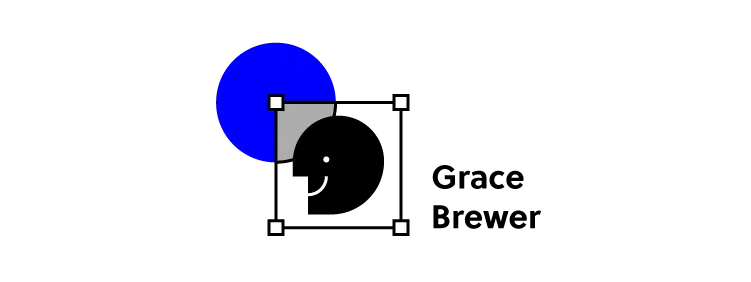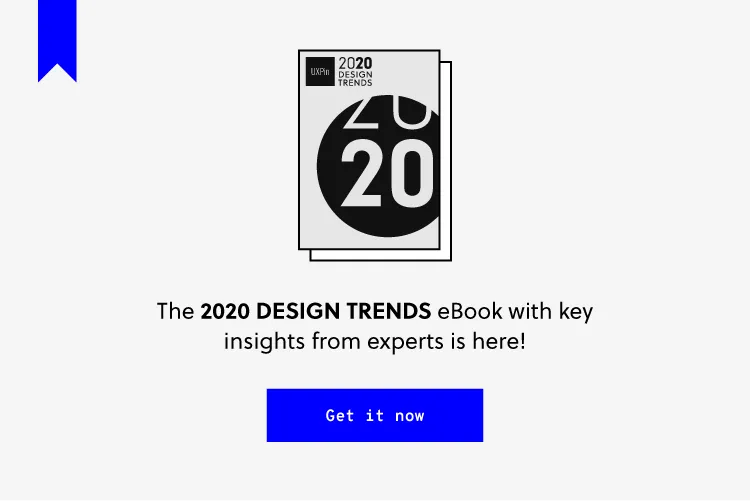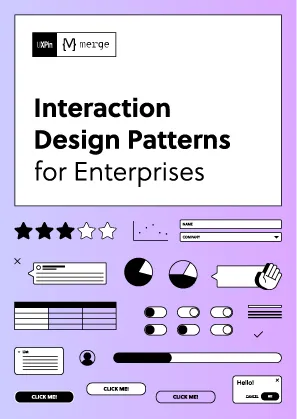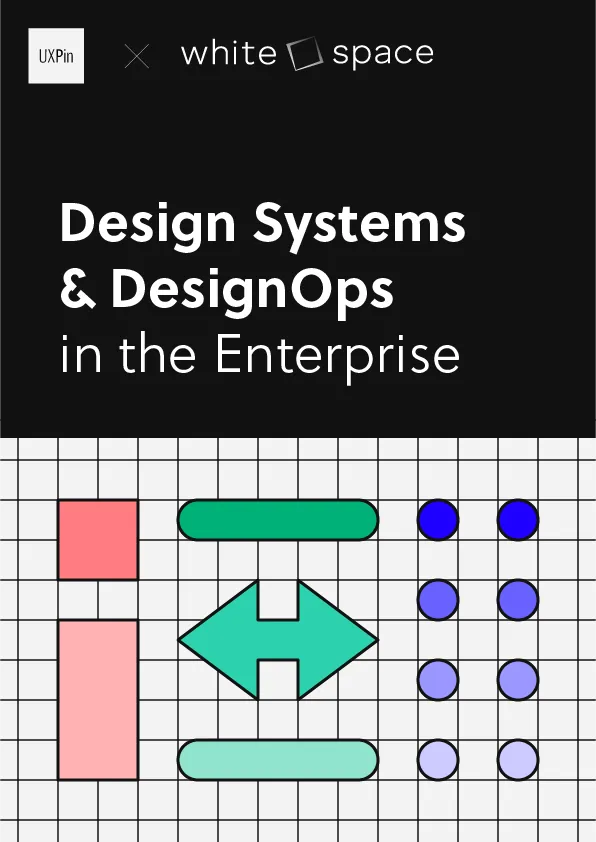Accessibility – First Design – 2020 Design Trends with Grace Brewer

UXPin: Welcome to 2020 Design Trends for UXPin. We’re here to talk a little bit about design trends for 2020. First of all, please tell us a bit about yourself.
Grace Brewer: Hello, my name is Grace Brewer. I lead a small design team at a medium-sized healthcare IT company that’s based out of Kansas City. Our team just started about four years ago. It’s been really exciting to see the company become more design mature. We utilize UXPin and we’re very big fans. We’ve spoken on behalf of it before because we find the tool to be really user-friendly and extremely powerful for what we need to do, particularly for designing healthcare software.
And then as far as usability testing we use some other tools for tracking metrics which is really important for what our team does, including validating moderated user testing. In our field it can be really hard to get face-to-face with our users since we’re working with those in healthcare.
UXPin: Because you work for the healthcare industry, I would like to ask you how the practice of inclusive design and accessibility will grow in 2020 in your opinion. Is this trend important to you?
Grace Brewer: Yes, definitely. I think being in healthcare software we need to think about that more so than other sectors. But the great thing about that trend is that we’re beginning to understand how it applies to so many different types of technology. Overall, designers have more of an eye on it, even for things that we might not have necessarily associated with accessibility. So it’s important for us, especially because we get checked for whether we’re meeting regulatory standards. It’s been top of mind for us for quite a few years now. But I do think it’s just going to become more and more common amongst those in other sectors as well, which is really exciting.
UXPin: I read something a couple of days that had me thinking, which said, “when is the time companies will measure how many disabled people are using their app?” Because if only one person uses your app, you should be thinking about accessibility, right?
Grace Brewer: Yes. I think it goes beyond a change in mindset. If you go into it with the mentality that we have to account for 20 people who maybe have this sort of disability, versus 20 people who are different in another way, then you’re always going to end up kind of excluding someone or just not doing it quite “right”. It’s more than just being creative in the way that you actually build your software – you need to allow for people who have different needs to be able to actually use it effectively. It’s not necessarily, “Here’s this group of people and here’s this group of people.” You can think of it in a more inclusive way overall, how to help people who might have different backgrounds – and not just disabilities. Of course, there are many things that can lead to design changes and approaching software differently. We focus on all the ways we can think of it in a more holistic way.
UXPin: Do you think that 2020 is going to be the year that people are going to think holistically about that?
Grace Brewer: Goodness, it’s so hard to say because every company moves at a different speed. If you look at today, there are so many different companies that are on different levels. So, like anything, it’ll take time for different groups. Some will move more quickly towards that than others, but hopefully 2020 will be the year that it gets more traction.
UXPin: More designers are advocating for accessibility, so I think the trend is going to be pretty huge in 2020. My next question to you would be: minimalism or maximalism? I can see that there are two versions of design and two sides of the trend. Which party would you consider yourself in?
Grace Brewer: I don’t know. Once again, I think it’s kind of hard to say because it just depends on the market you’re in. Some types of software or some types of designers can get away with a little bit more. For healthcare, we don’t get to try as many of the hot new trends because they move in and out very quickly, and healthcare software would not be able to keep up with that. But also, we are utility-focused – people come into our software needing to get a job done.
For us, we are a little bit more on the side of minimalism. The more straightforward that we can make it, that’s us doing our jobs well. We’re not trying to compete in a market where we’re convincing people to download our app versus another app. We know that our users typically don’t have a choice in the matter, because they’re the ones who work at the hospital. The hospital is the one buying the software, but we want to make sure that the employees also enjoy the experience. So the simpler we can make it for them is usually the route that we have to take.
UXPin: So it’s not whether it sparks joy like Marie Kondo said, but it’s about usability, right?
Grace Brewer: Yes, exactly. And to that point, for those who have more consumer-facing apps, it can be very joyous and very happy-inducing for users to actually see a minimalist design sometimes. But there’s always a place for both routes.
UXPin: Exactly. So my next question to you would be, I assumed that you are aware that Pantone said that classical blue is the 2020 color, but do you think that there will be another color that would be the new black of 2020?
Grace Brewer: I don’t know. It’s always hard to compete with blue. Obviously, if you look at the amount of logos that are blue, it is always something that’s very accessible to a lot of people. There’s a lot of psychology behind that. So I don’t have any particular [color] in mind, but you know there’s always something that comes out of left field. Obviously when material design happened, nobody expected that pink was going to be the hot new thing.
UXPin: There’s this whole psychology of colors, right? And blue is connected with the intellectual sphere, etc. So I think that’s why blue is connected with the tech industry. But as you said, you never know. What is your favorite emerging trend in your field of design and industry? Meaning healthcare, obviously, but also you are a UX designer. So please share anything that pops into your mind that would be what you are most excited to watch for in 2020.
Grace Brewer: Something that I find particularly exciting is the fact that the lines between business and design are becoming a little bit fuzzy but in a very good way. In recent years there’s been a lot of teaching business leaders about design. There’s been design thinking and trying to democratize design and make it more accessible to people. But I’m really excited for a little bit going the other way, with designers getting more involved with business decisions and understanding a little bit more of that side. It aligns with my passions because I also find the way that businesses are run to be very interesting.
Grace Brewer: But I do think it is becoming more prevalent because for so many years now, as designers, we’ve said, “We really want a seat at the table.” That’s a very common phrase. And we need to make sure that once we do get that seat at the table, we really understand what that means and switch from this mindset of, “Okay, what does the design team need?” Because for so long we were really having to fight for just getting resources on design teams, but we need to switch that mentality to what the business needs and how can the design team help.
UXPin: Usually designers are considered artistic souls who wouldn’t know anything about business. And there are strict rules, how to design stuff, especially apps and how to bring business value.
Grace Brewer: I completely agree. For so many years it was really easy to write us off as creative idealists. There’s been a lot of trends that helped that. Big data and more focus on user research has helped people understand that we’re not just making these decisions because we think they look pretty. But I think the next step will be us being able to speak the language as far as how businesses are run so that we can also understand how what we’re doing fits into a bigger business strategy.
UXPin: So you think design thinking is one of the ways to develop this kind of thinking in the whole company?
Grace Brewer: Yes, I think so. It’s funny – for the past few weeks my team has been doing weekly UX research time for continued learning. And for the past several weeks, I’ve just been reading design-thinking articles – ones that are for design thinking and ones that are against design thinking. And it’s really interesting because there are definitely arguments on both sides of the spectrum. Like anything, it can be used incorrectly and it can be used to say [a company is] really design mature, when really they aren’t. But there are also times where it can really help spread the word and help people understand that we need to not just make decisions to make decisions. We need to validate these assumptions. We need to iterate. So, like anything, of course there’s a good and a bad way to apply it, but I think generally helping people better understand design and understand the value that it provides is a good thing.
UXPin: I agree completely. So my last question is what are your professional goals for 2020? Are you following some kind of trend or going against it? What are your new year’s resolutions?
Grace Brewer: I have a passion for the way businesses are run. So I think mine is learning more of the business side. I already listen to some business podcasts, but I think within my own company, especially now that I lead a team, I want to start being a little bit more proactive of going after those business conversations and trying to have more understanding, and really making it known throughout the company. I want them to know that I want to listen in for things so that I can learn more about it.
I’m also very excited to see what UXPin has to offer because when you guys release a new feature, my team always says, “Did you see what they did? Did you see how it does this?” We always find that to be a really great part of our year as well.
UXPin: Yes, we have a few amazing things coming up in 2020. So I’m going to make sure you’re one of the first ones to see the new version.
Grace Brewer: Thank you very much.


